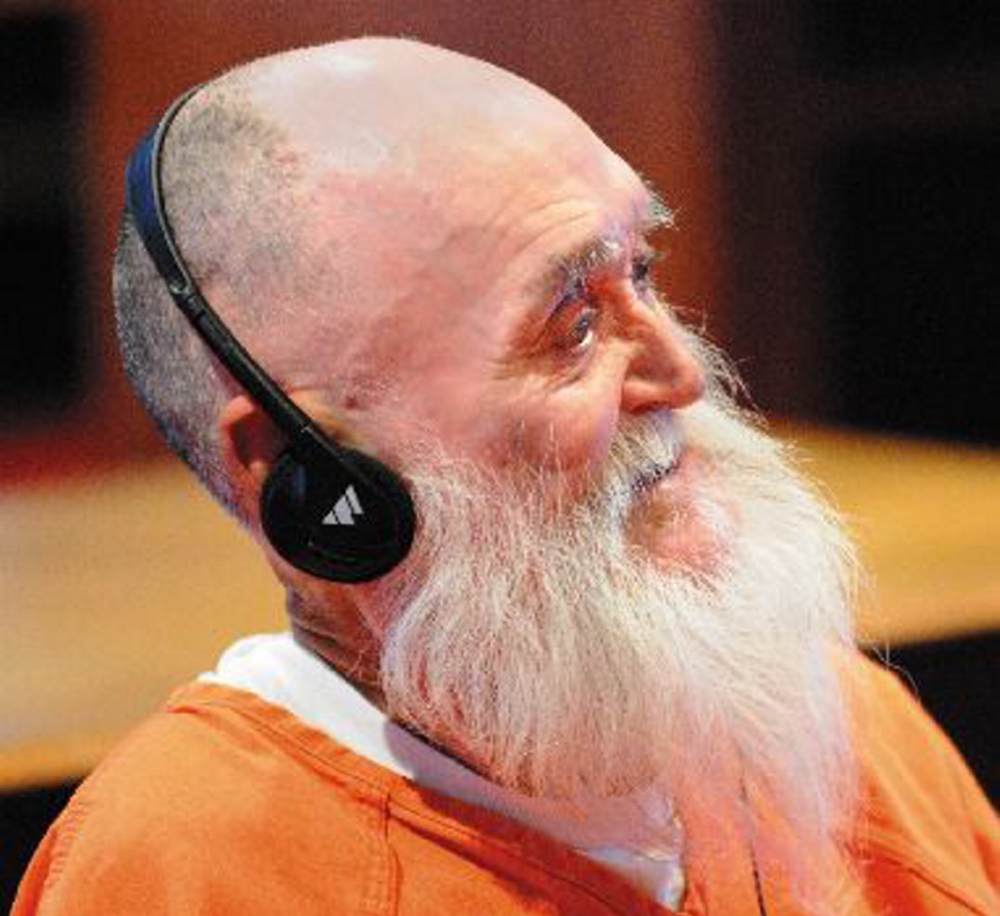AUGUSTA — Attorneys for a former homeless Seattle man charged in a 1976 slaying in Augusta argued Friday that the evidence is so old it is suspect and that a charge of criminal homicide should be dismissed.
Gary Raub, 65, who is also known as Gary Wilson, was in Kennebec County Superior Court on Friday. He is accused of stabbing to death his former landlady, Blanche Kimball, in her State Street home in June 1976. A trial is set for late August.
Raub, in an orange jail uniform and with the long white beard he’s had since his arrest, sat quietly through the two-hour session.
He has been held in jail since he was extradited from Washington state more than a year ago.
Raub was indicted on the charge of criminal homicide in the first degree – the equivalent of a murder charge today – in 2012. He was homeless and living on the streets in the University District of Seattle when he was arrested following an undercover sting.
He participated in what he was told was a survey about chewing gum, but was actually a ploy by law enforcement to get his DNA.
Maine investigators say that his DNA matched that found on items collected at the 1976 crime scene, which led to the charge.
‘SOMETHING SLOPPY … HERE’
On Friday, Justice Roland Cole ruled that the state would have to prove the chain of custody of those items at trial rather than at a pretrial hearing as requested by defense attorneys.
He also refuse to dismiss the indictment against Raub despite the defense attorneys arguments that they received a number of items, including 181 photographs and information about an interview with an alternative suspect, late in the case.
One of Raub’s defense attorneys, Sherry Tash, argued that the some of the items where Raub’s DNA was allegedly found could have been contaminated while they were in police and crime lab custody.
“There’s something sloppy going on here that becomes a very egregious situation,” Tash said, asking how failing to hand over copies 181 photos from the scene “somehow became an oversight.”
She said there was a 22-year gap in information about the storage location of a drawer seized from Kimball’s kitchen.
“The only evidence the state has is the DNA, so that becomes incredibly important,” Tash said. “I don’t know that we have any admissible information for decades about how this drawer was handled.”
She challenged the chain of custody of five specific items, including paper from that drawer, a shard of green glass, a bucket from the living room where Kimball’s body was found, and a white slip-on shoe, all of which the state has said showed evidence of Raub’s DNA.
‘FOR A JURY TO DECIDE’
Assistant Attorney General Lara Nomani told the judge that the state is prepared to authenticate those items in a number of ways, including by chain of custody, photographs, and testimony at trial.
“If (Tash) wants to argue the evidence collection practices of officers in 1976 don’t match those of 2013, those are issues of weight for a jury to decide,” Nomani said.
Cole said he would rule at trial on the authentication of each item.
Nomani said the state has given the defense attorneys over 2,900 pages of discovery, several disks of information, and access to the crime lab.
She also said the defense was given the name of a possible alternative suspect early, but did not turn over copies of the interview until later.
“A probationer claimed to have overheard a conversation about a man who had a knife that might have been involved in the Blanche Kimball homicide,” she said. However, she said authorities believe it had a longer blade than the weapon used on Kimball.
Nomani argued that the discovery violation was corrected long before a trial date was set.
On Friday, Cole set jury selection for Aug. 22 and indicated the trial would be held the following week.
The charge against Raub says he “knowingly inflicted great physical suffering” while intending to kill Kimball, a 76-year-old retired dental technician and practical nurse who occasionally took in boarders at her home. Raub, then known as Wilson, had lived in her home for a short time. He was questioned by police after Kimball’s death but denied any involvement.
He was convicted of burglarizing an Augusta home in December 1976 when police caught him with a knife in his hands, and spent five years in prison for that.
He also did time in a number of other jails in Washington State and elsewhere.
Interest in Raub as a suspect in Kimball’s death rekindled after he was accused in an October 2011 stabbing in Seattle of another homeless man.
Raub’s sister, who still lives in Washington state, has said previously that she believes her brother is innocent.
Raub was born on the Macah American Indian Reservation in Washington, one of eight children taken from their mother when they were young. He was later adopted by a couple named Wilson and came to New England with them.
Betty Adams can be contacted at 621-5631 or at:
badams@centralmaine.com
Twitter: @betadams
Send questions/comments to the editors.



Success. Please wait for the page to reload. If the page does not reload within 5 seconds, please refresh the page.
Enter your email and password to access comments.
Hi, to comment on stories you must . This profile is in addition to your subscription and website login.
Already have a commenting profile? .
Invalid username/password.
Please check your email to confirm and complete your registration.
Only subscribers are eligible to post comments. Please subscribe or login first for digital access. Here’s why.
Use the form below to reset your password. When you've submitted your account email, we will send an email with a reset code.